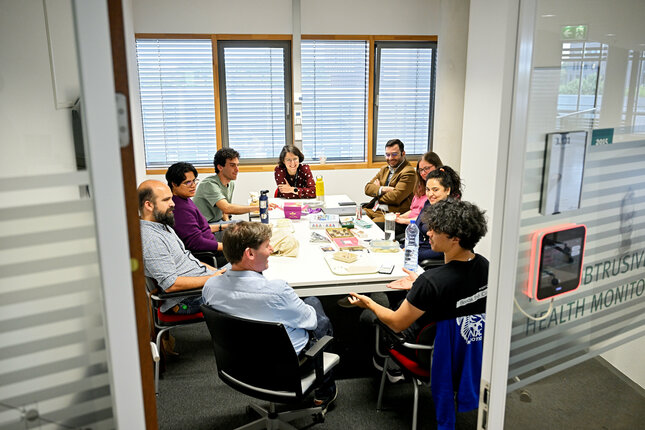Researcher Anne Roc'h dragged in an MSCA Doctoral Network project for the third time in four years. A vital feature of these European projects is that doctoral students are trained at different universities spread out over Europe. There are currently 42 doctoral students working on Roc'h's three projects. What is the story behind her success?
If she is honest, she did not expect to be successful again in her application for a European Marie Skłodowska-Curie Actions Network (MSCA) project in 2023. "It was the second time I submitted this proposal for PATTERN; it was not awarded last year. I improved the project proposal and submitted it again. This time successfully."
Frenchwoman Anne Roc'h, assistant professor in Electrical Engineering, is modest. She speaks initially of being lucky when she tells of the third successful application in four years of funding for a European MSCA project. In the 2023 round, only 11 percent of the proposals submitted were honored, thus including her second project application for PATTERN.
Electromagnetic noise
Roc'h's researcher's heart beats faster regarding electromagnetic interference (EMI). It is central to all of her research projects. An unwanted electromagnetic field is created in every electronic device when turned on; this is called electromagnetic noise. You can't see it, yet it can cause interferences in other devices.
"For example, measurements in medical systems can be disturbed by EMI: a screen would be a typical 'victim'. Or sensors in electric cars would not work properly when the electric motor is running if we do not consider EM noise during the car's design. The annoying sound of a speaker predicting your phone will ring is another example."
Electromagnetic noise is like an uninvited guest with which we must learn to deal.
Assistant professor Anne Roc'h
"You always get electromagnetic noise for free with electronic devices. It's like an uninvited guest that all companies in the high-tech industry have to deal with. We are, therefore, working intensively with Philips, Canon, and NXP, for example, to investigate how we can minimize EMI in their products.
"In our community of EM noise specialists, we are working along with nature, always discovering new things. There is still so much to learn. Every case is different and requires a different solution. More and more electronic devices are being developed and used. There will only be more challenges in the future, which we will take on with our growing international research community."

My field of work is not about competition. It's about working together to solve problems for society.
Assistant professor Anne Roc'h
That community is characterized by close collaboration, Roc'h says. "My field of work is not about competition. We have to work together to solve problems for society. You won't get ahead if you don't talk to each other and share your knowledge. That goes for us and our industrial partners."
Making the translation into better electronics and thereby helping society is the higher goal. "There is still so much to do; I won't solve everything before the end of my career. Fortunately, with the PhD students from our Doctoral Network grants, we are training more and more researchers who can take over in the future."
About the Marie Skłodowska-Curie Actions Doctoral Network
The Marie Skłodowska-Curie Actions Doctoral Network (MSCA) is a Horizon Europe-funded network within which doctoral students are trained. The projects have a budget between 2.5 and 3.5 million euros. Per project, between 10 and 15 PhD candidates are assigned to different partners. The PhD candidates receive an extensive training program, and during their PhD trajectory, they also work for several months at another institution or an industrial partner on their research.
Within a Doctoral Network project, research is central, but, more than in other EU projects, it is also about the development of the young researchers.
Image: iStockphoto / johan10







